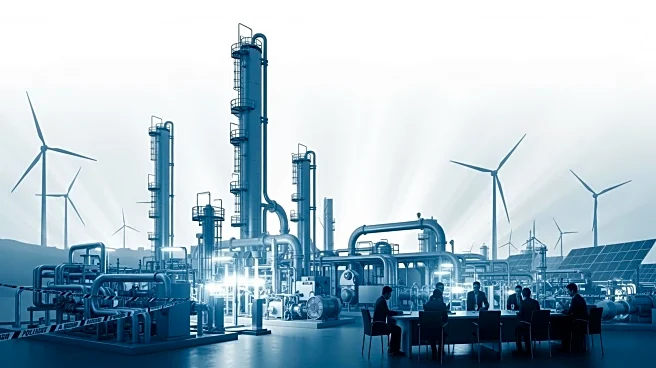What's Happening?
The growth of U.S. biofuels production capacity experienced a slowdown in 2024, with an increase of only 3% from the start of 2024 to the start of 2025. This deceleration was primarily due to a reduction
in the expansion of renewable diesel and other biofuels. Notably, renewable diesel production capacity increased by just 391 million gallons per year, significantly less than the growth seen in previous years. The slowdown was attributed to changes in biofuel margins and petroleum refining margins, which have influenced investment decisions. Despite this, fuel ethanol production capacity saw a notable increase, accounting for 73% of all biofuels production capacity, largely concentrated in the Midwest.
Why It's Important?
The slowdown in biofuels production capacity growth has significant implications for the U.S. energy sector. Renewable diesel and other biofuels are crucial for reducing carbon emissions and transitioning to cleaner energy sources. The reduced growth in renewable diesel capacity could impact the U.S.'s ability to meet renewable energy targets and reduce reliance on fossil fuels. Additionally, the increased focus on sustainable aviation fuel (SAF) highlights a shift towards alternative fuels in the aviation industry, which could drive future investments and policy changes. The changes in biofuel margins and petroleum refining margins reflect broader economic trends that could influence future energy strategies.
What's Next?
Looking ahead, the U.S. biofuels industry may see further shifts towards sustainable aviation fuel and other emerging biofuels as companies adapt to changing market conditions. The completion of conversion projects, such as those by Phillips 66 and Diamond Green Diesel, indicates a potential increase in SAF production capacity. However, the industry may continue to face challenges related to biofuel margins and investment in renewable diesel capacity. Policymakers and industry stakeholders will need to address these challenges to ensure continued progress towards renewable energy goals.
Beyond the Headlines
The slowdown in biofuels production capacity growth raises questions about the long-term sustainability of the U.S. energy transition. The reliance on biofuels as a key component of renewable energy strategies may need to be reevaluated in light of changing market dynamics. Additionally, the focus on SAF and other emerging biofuels could lead to new technological advancements and innovations in the energy sector. The industry's ability to adapt to these changes will be crucial for achieving environmental and economic objectives.









